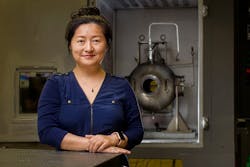Patented Purdue design inspired by Tesla valve could improve performance of rotating detonation engines
WEST LAFAYETTE, Ind. - Researchers in Purdue University’s College of Engineering are testing a patented Tesla valve-inspired injection manifold design that could improve the performance of rotating detonation engines. RDEs are being developed as next-generation solutions in the field of jet and rocket propulsion, the university reports. Continue reading original article.
The Military & Aerospace Electronics take:
28 February 2024 -Li Qiao, a professor in the School of Aeronautics and Astronautics, is conducting numerical demonstrations on the design.
Qiao said RDEs convert chemical energy into thrust, with a flame traveling through the engine at supersonic speed, which can be 10 times faster than in a traditional engine.
“RDEs are much more efficient than traditional engines by consuming less fuel and achieving high power of thrust in much less time,” Qiao said. “An RDE has no moving parts — turbines or compressors — which makes it less complex and less expensive to manufacture.”
Qiao said RDEs face stability drawbacks, however. The pressure behind a detonation wave in the engine is enormous, but there is high pressure on the wave to move backward. That pressure could reverse the flow of the fuel and oxidizer injectors.
Related: Venus Aerospace announces successful test of its rotating detonation rocket engine
Related: NASA seeks industry input on rotating detonation rocket engine development
Jamie Whitney, Senior Editor
Military + Aerospace Electronics

